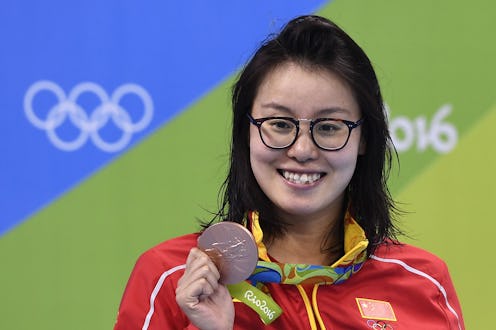News
The One Olympic Moment That Meant The Most To Me
A lot happens at the Olympics besides athletes breaking records and winning medals. (If it were just that, we'd get bored pretty quickly.) Keeping up with tradition, the 2016 Rio Olympics have been pretty entertaining so far — and one of the most noteworthy moments was when Chinese swimmer Fu Yuanhui told the whole world that she was on her period.
On Sunday, after Fu's team came in fourth place in the 4x100-meter relay, she was clearly disappointed in the outcome. She was doubled over in pain as she was being interviewed, and when the reporter commented on it, suggesting that she was dealing with intense stomach pains, Fu responded that she was menstruating. "Actually, my period started last night. So I'm feeling pretty weak and really tired," she said. "But this isn't an excuse. At the end of the day I just didn't swim very well."
Twitter pretty much blew up after that. People from all around the world were coming forward to send messages of encouragement to Fu and praise her for daring to be so bold about her period, which is still, amazingly, considered a taboo subject.
Women everywhere (including me) rejoiced upon hearing Fu's candor. She's an athlete who had already proven herself to be funny and outspoken, and this comment simply made everyone love her even more. However, I couldn't help but think that Fu's Chinese heritage made this moment way more significant than if it would have been had a white American woman said the same.
Although the United States certainly has its fair share of period taboo, the consequences of period taboo are often much more debilitating in other countries. For instance, there are rules in Nepal insisting that women on their periods cannot touch certain items until after the bleeding has subsided, and they're forced to isolate themselves in a dark room. In China, tampons are thought to rob you of your virginity and tampon ads aren't allowed on primetime TV. As a result of such strong stigma (and poor education) around periods, many Chinese women admit they had no idea what tampons even were before they arrived in the United States for the first time. There are even cultural beliefs (read: myths) in Japan that women who are menstruating have faulty taste buds, so they're not allowed to handle and prepare sushi.
White men often fetishize us while white women often appropriate parts of our culture they find to be attractive, all the while ignoring the rest of who we are as individuals. To see Fu blow the lid off of all these harmful stereotypes with a single remark about her period has been particularly delicious.
In countless developing countries, girls don't even know what a period is until they're hit with their very first, and many of these girls are not allowed to go to school while menstruating. And that's just the tip of the iceberg when it comes to problems tied to lack of knowledge about periods: 70 percent of reproductive diseases in India are caused by a lack of menstrual hygiene and education. Our world is clearly failing to make menstrual health an issue, and one of the primary problems is that we often don't even talk about it with young girls who are on the cusp of puberty.
So it's no wonder Fu has become a hero of sorts for many girls in China. Evidence of Fu's impact can be seen online, such as in the writing of one Chinese woman following Fu's interview: "Fu Yuanhui said she had her period, and this outraged people who called it 'filthy' and 'dirty', and asked how she could say such a thing. This is the 21st century, and a woman still has to be ashamed about getting her period? Men out there, go home and ask your wife or mother (about menstrual symptoms)."
If this comment had been made by a white swimmer from the United States, I'm not sure if the response would have been the same from so many women in Asian countries who were watching the Olympics. When Mashable reported on the outpouring of positive comments from Chinese women, it became clear that they identified with Fu because she was from their home country, so her boldness was appreciated and valued so much more.
This Olympic hero could inspire people in numerous countries around the world to talk more with the younger generation of girls about their periods. Simply bringing it up in conversation is the first step to making policy and health care changes needed for women to manage their natural periods.
As an Asian woman watching Fu unleash her honesty on the world, I couldn't help but see yet another way in which she has broken down some big barriers. Unfortunately, there have always been distressing stereotypes about Asian women in the Western world, the kind that pave the way for tasteless terms like "yellow fever." We're often assumed (or joked about) to be submissive and shy, nerdy and naive. White men often fetishize us while white women often appropriate parts of our culture they find to be attractive, all the while ignoring the rest of who we are as individuals. To see Fu blow the lid off of all these harmful stereotypes with a single remark about her period has been particularly delicious. The world needs to understand that each Asian woman, including Fu, has her own personality and her own voice.
These may seem like minute details, but they might mean the world to Asians across the globe. In that brief interview, Fu was not only a shining light for menstruating women everywhere — she was a megastar athlete who made Asian women proud.
